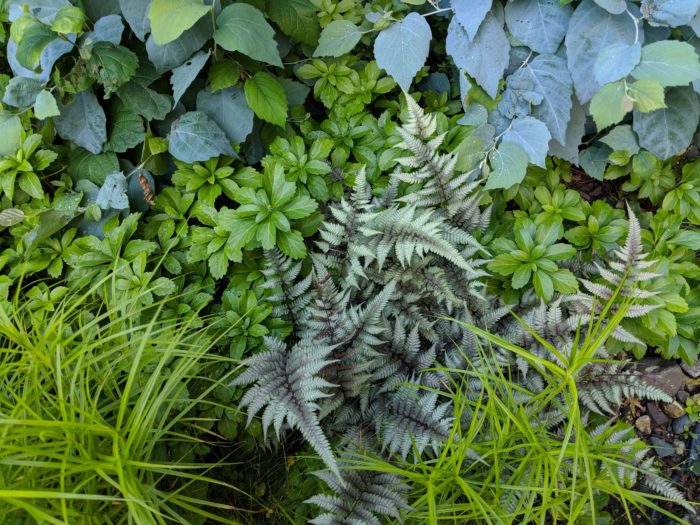
I’m Michelle Gerner, and I garden on a small city lot in St. Paul, Minnesota (Zone 4b/5a). In 2010 I decided to get rid of the grass in half of my front yard, right next to the public sidewalk, and replace it with shrubs and perennials. This garden has heavy clay soil and tricky light conditions, with one little strip of full sun, patches of partial shade, and a few areas of nearly full shade. I’m always trying new plants to see what will thrive here (and not get eaten by the abundant rabbits). I’ve slowly built up layers in the garden to have three seasons of interest for the benefit of the many daily passersby. Having a front yard garden is a great way to get to know your neighbors!
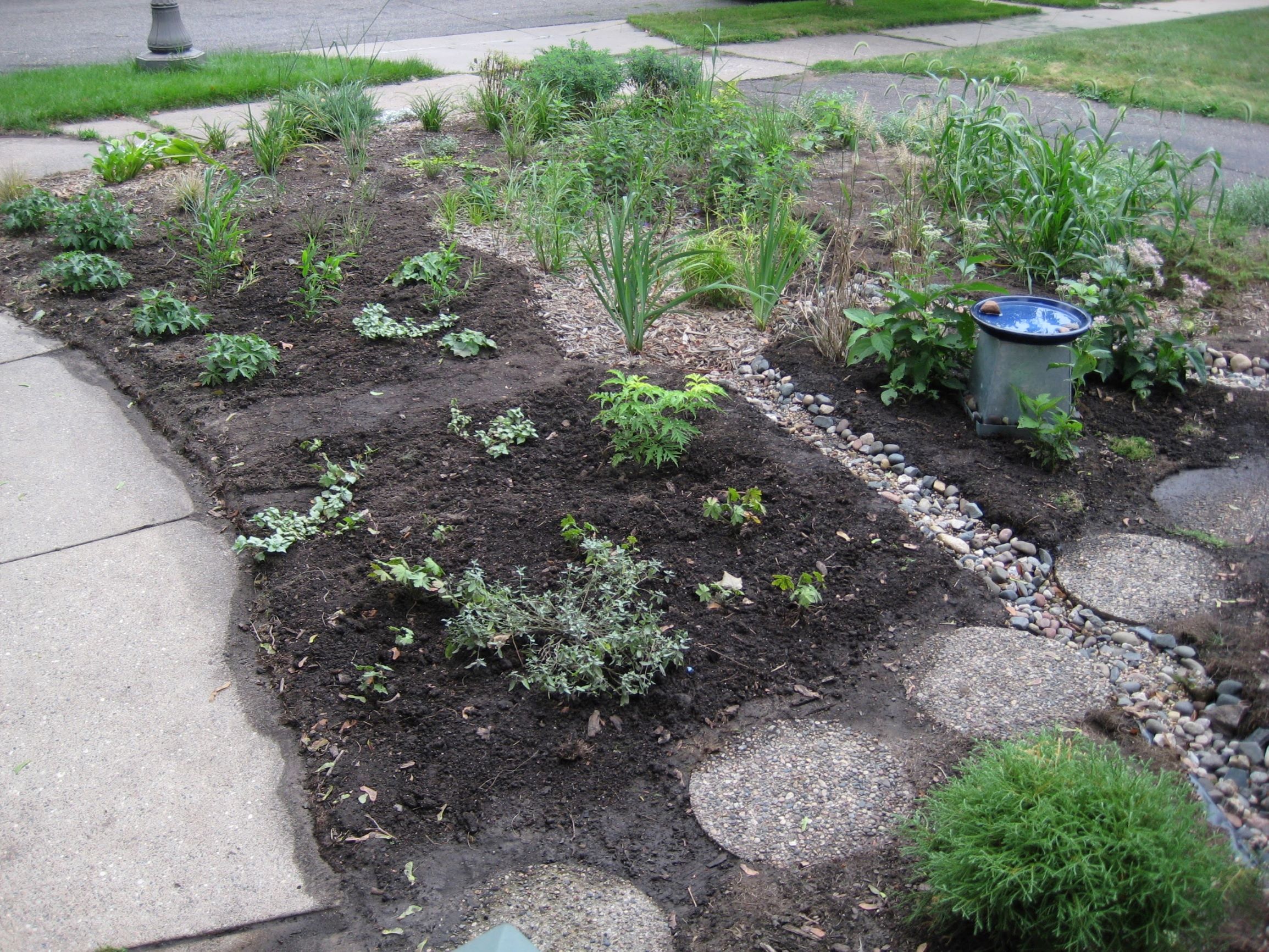 The newly planted garden, 10 years ago, looked a bit sparse. Nearly all the plants were divisions I got from friends and family, or perennials I grew by winter sowing seed. The two rock-filled “gutters” channel all the rainwater from the front half of the roof into the central rain garden.
The newly planted garden, 10 years ago, looked a bit sparse. Nearly all the plants were divisions I got from friends and family, or perennials I grew by winter sowing seed. The two rock-filled “gutters” channel all the rainwater from the front half of the roof into the central rain garden.
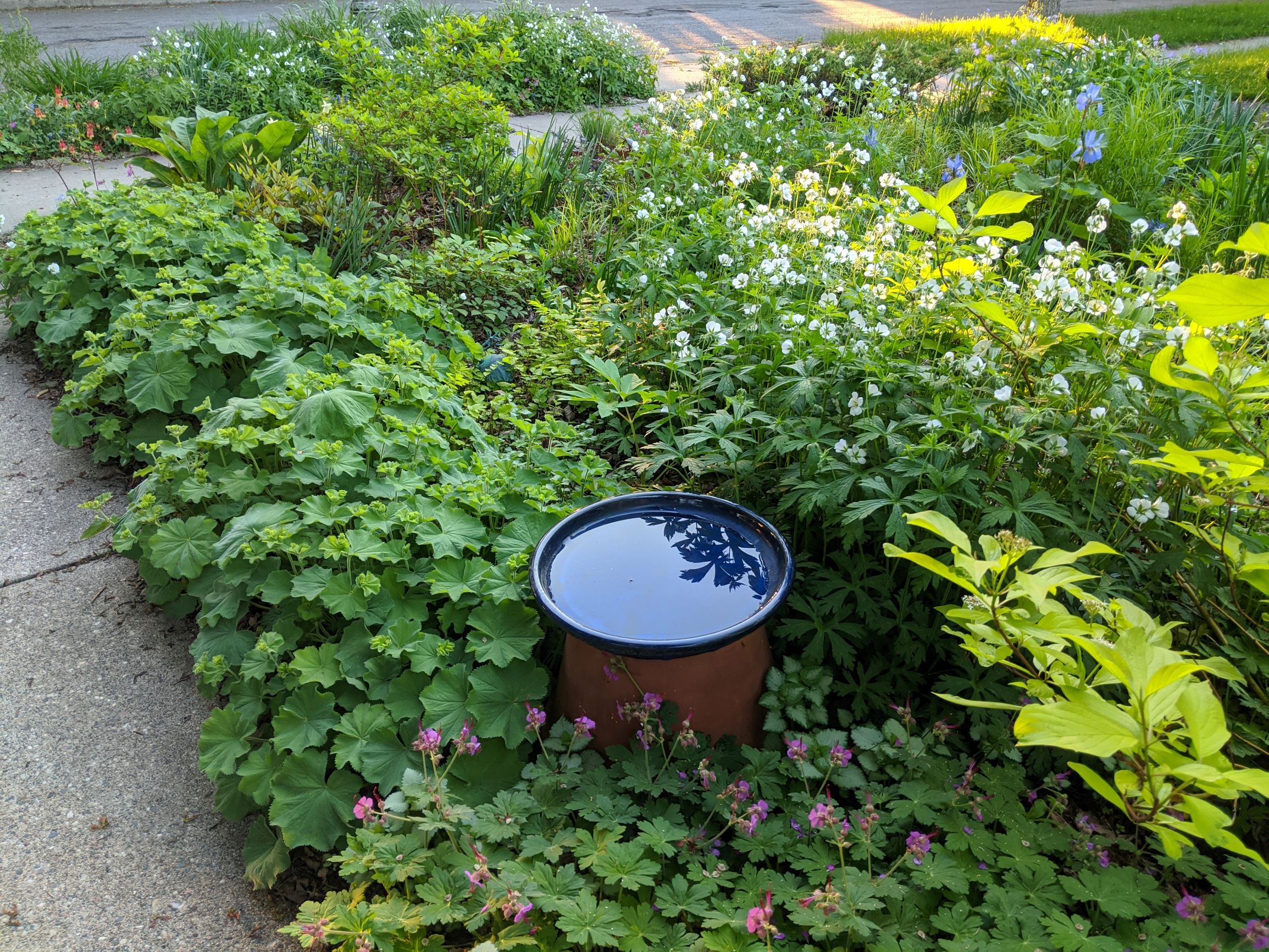 Ten years later the garden is full of plants—maybe a bit too full at times. A few years after I started the front yard garden, I also converted the grass boulevard strip into a garden, visible in the upper part of this photo. This photo is from late May. The white flowers are Geranium maculatum var. alba (Zones 3–8)—the white variation of the native geranium, which has reseeded itself throughout the garden. Magenta-flowered Geranium macrorrhizum (Zones 4–8) are just starting to bloom, as are the Alchemilla mollis (Zones 3–8) along the sidewalk. A couple stray branches of Cornus ‘Prairie Fire’ (Zones 3–7) poke in from the right. Geranium macrorrhizum is the most indestructible plant I’ve ever grown, and it’s semi-evergreen even this far north.
Ten years later the garden is full of plants—maybe a bit too full at times. A few years after I started the front yard garden, I also converted the grass boulevard strip into a garden, visible in the upper part of this photo. This photo is from late May. The white flowers are Geranium maculatum var. alba (Zones 3–8)—the white variation of the native geranium, which has reseeded itself throughout the garden. Magenta-flowered Geranium macrorrhizum (Zones 4–8) are just starting to bloom, as are the Alchemilla mollis (Zones 3–8) along the sidewalk. A couple stray branches of Cornus ‘Prairie Fire’ (Zones 3–7) poke in from the right. Geranium macrorrhizum is the most indestructible plant I’ve ever grown, and it’s semi-evergreen even this far north.
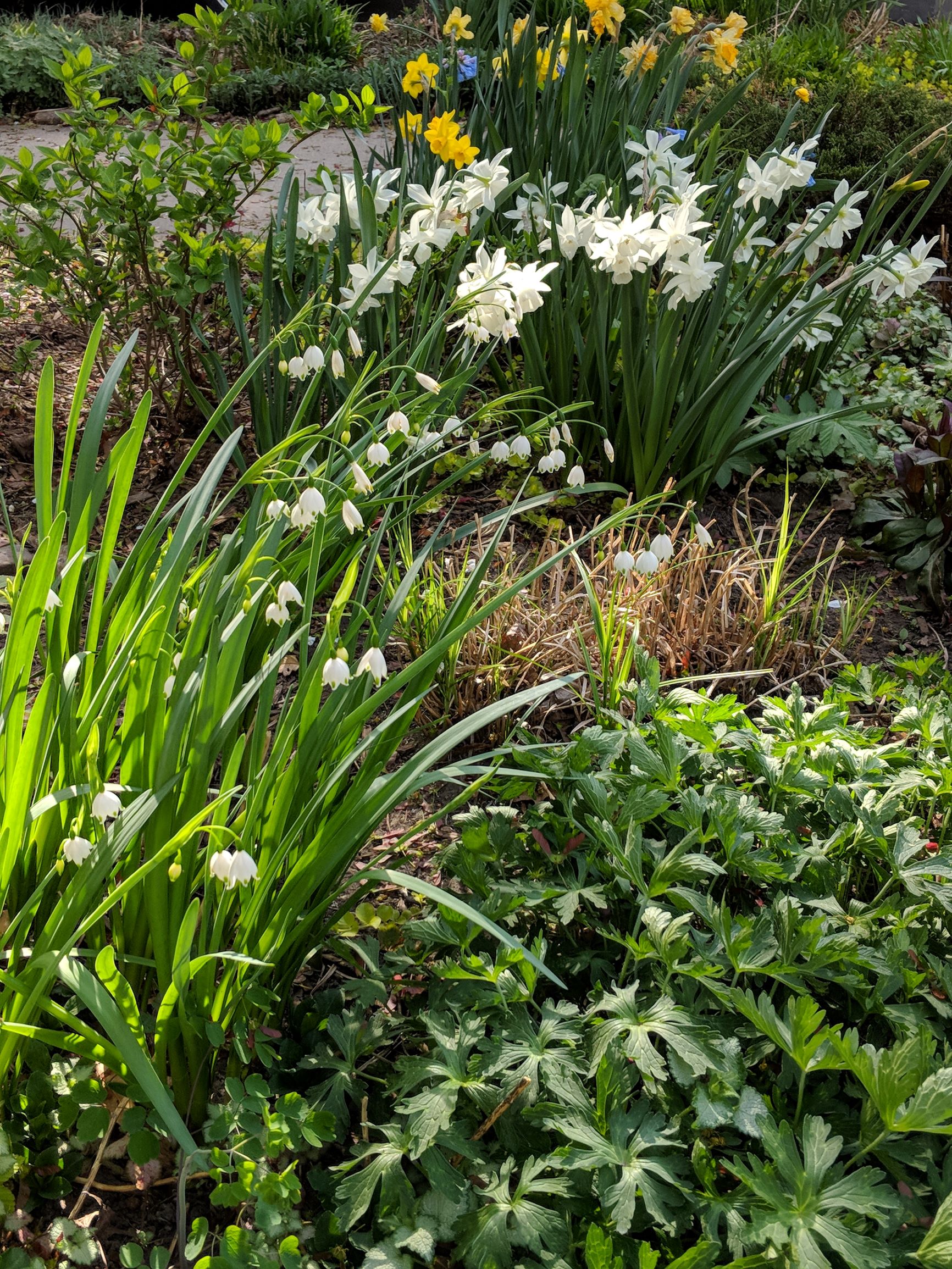 Mid-May blooms include Leucojum aestivum (Zones 4–8), various yellow narcissus, and white Narcissus ‘Thalia’ (Zone 3–8).
Mid-May blooms include Leucojum aestivum (Zones 4–8), various yellow narcissus, and white Narcissus ‘Thalia’ (Zone 3–8).
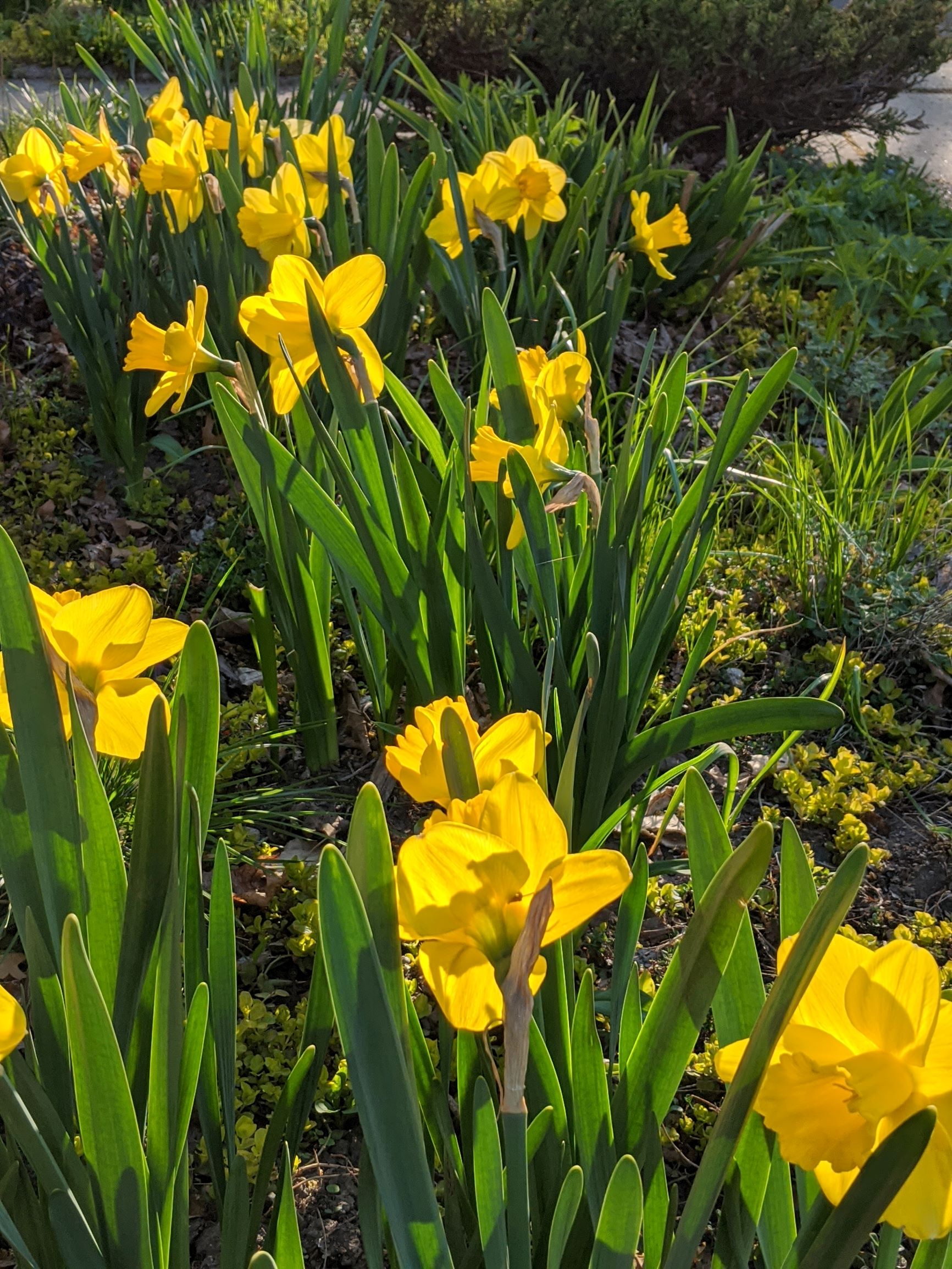
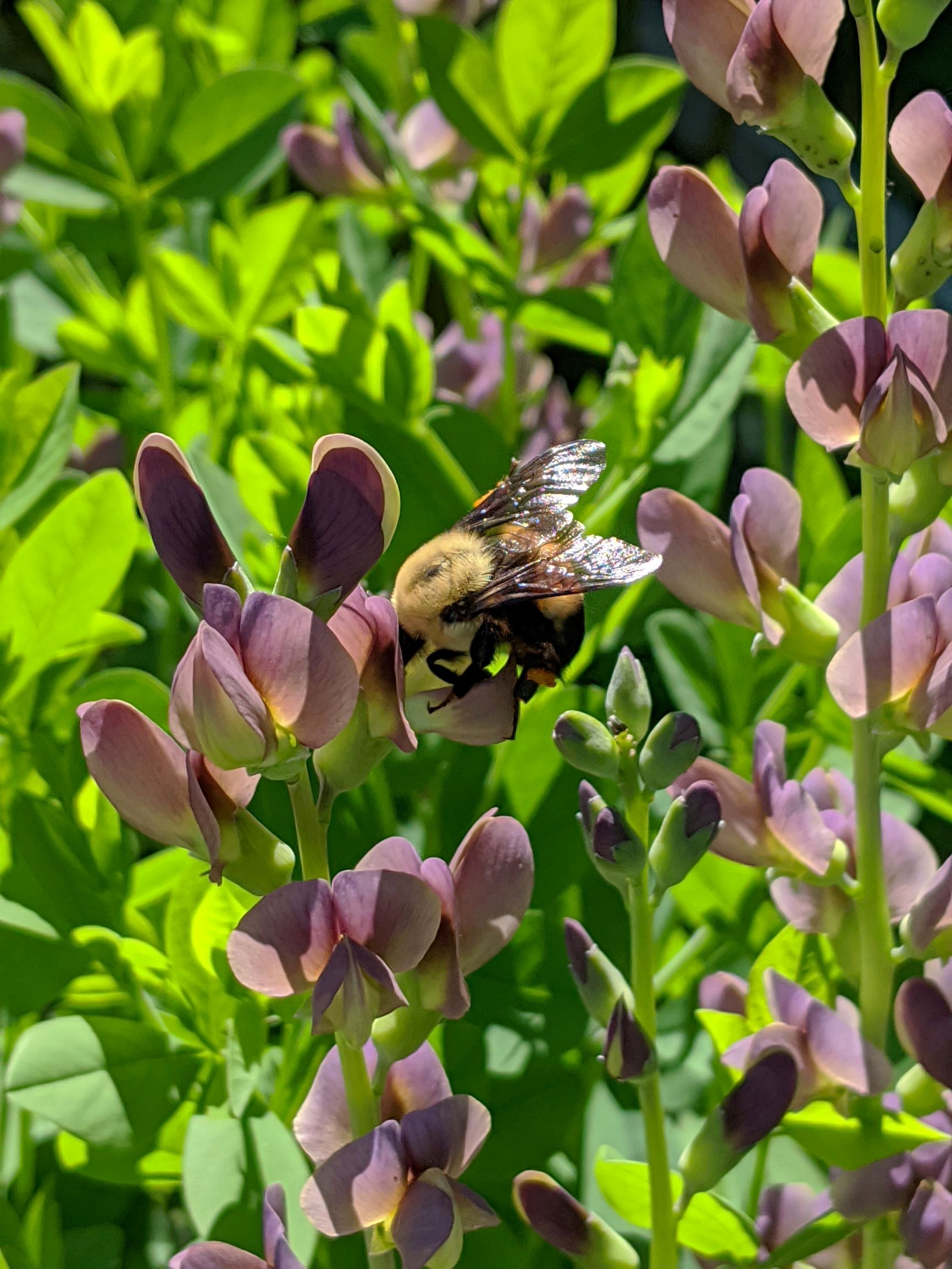
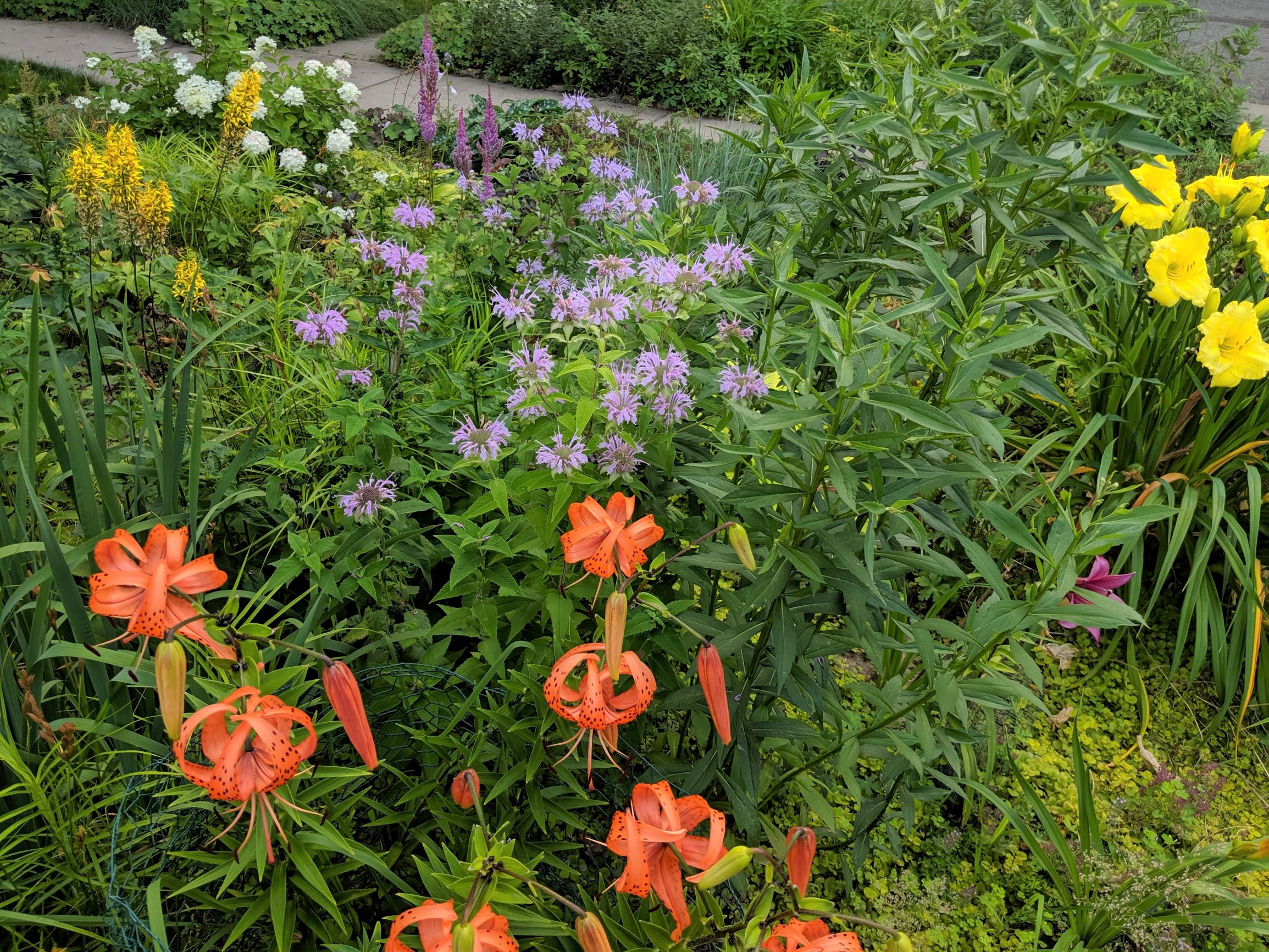

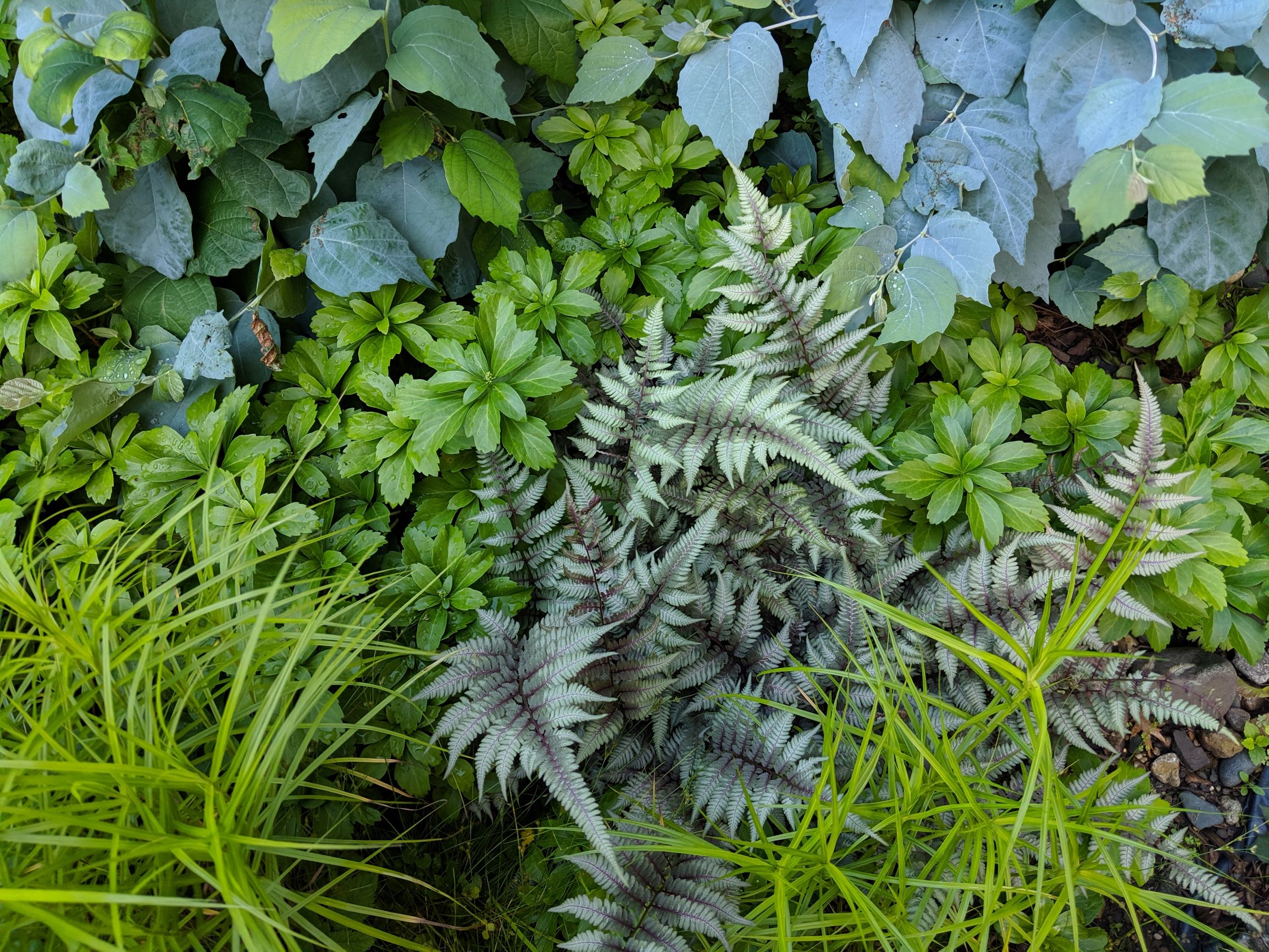
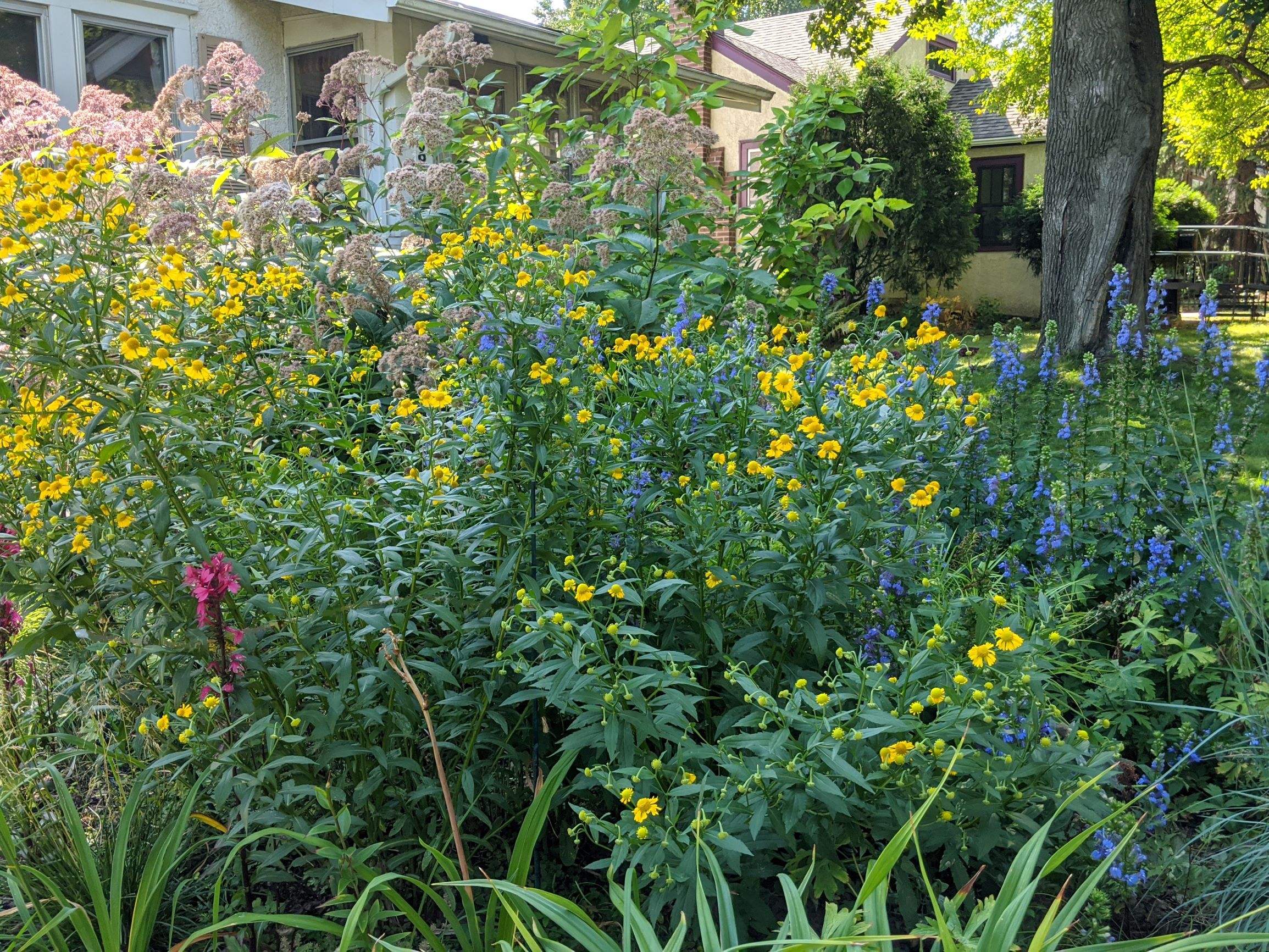
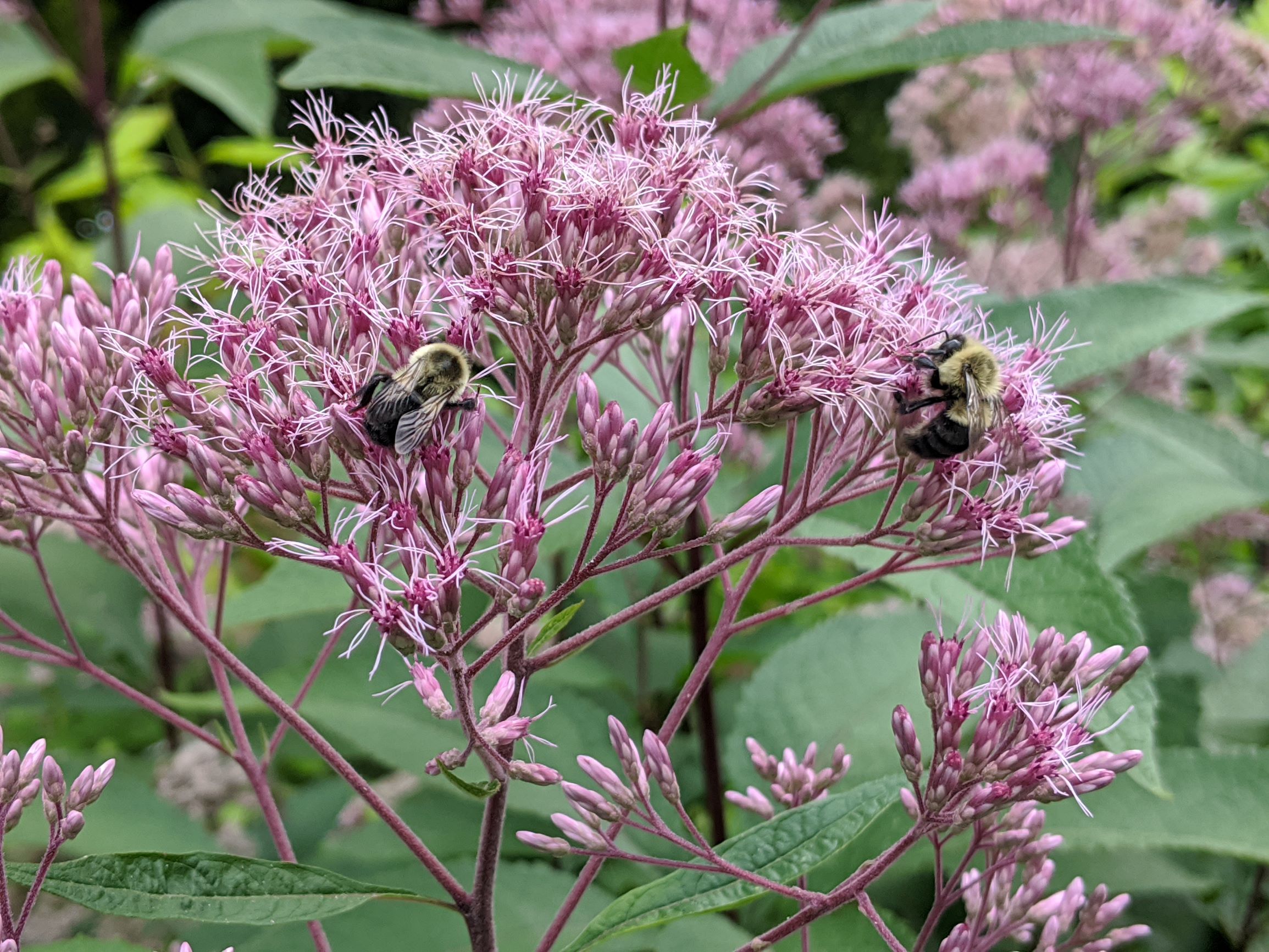
Have a garden you’d like to share?
Have photos to share? We’d love to see your garden, a particular collection of plants you love, or a wonderful garden you had the chance to visit!
To submit, send 5-10 photos to gpod@taunton.com along with some information about the plants in the pictures and where you took the photos. We’d love to hear where you are located, how long you’ve been gardening, successes you are proud of, failures you learned from, hopes for the future, favorite plants, or funny stories from your garden.
If you want to send photos in separate emails to the GPOD email box that is just fine.
Have a mobile phone? Tag your photos on Facebook, Instagram or Twitter with #FineGardening!
You don’t have to be a professional garden photographer – check out our garden photography tips!
Do you receive the GPOD by email yet? Sign up here.
Fine Gardening Recommended Products
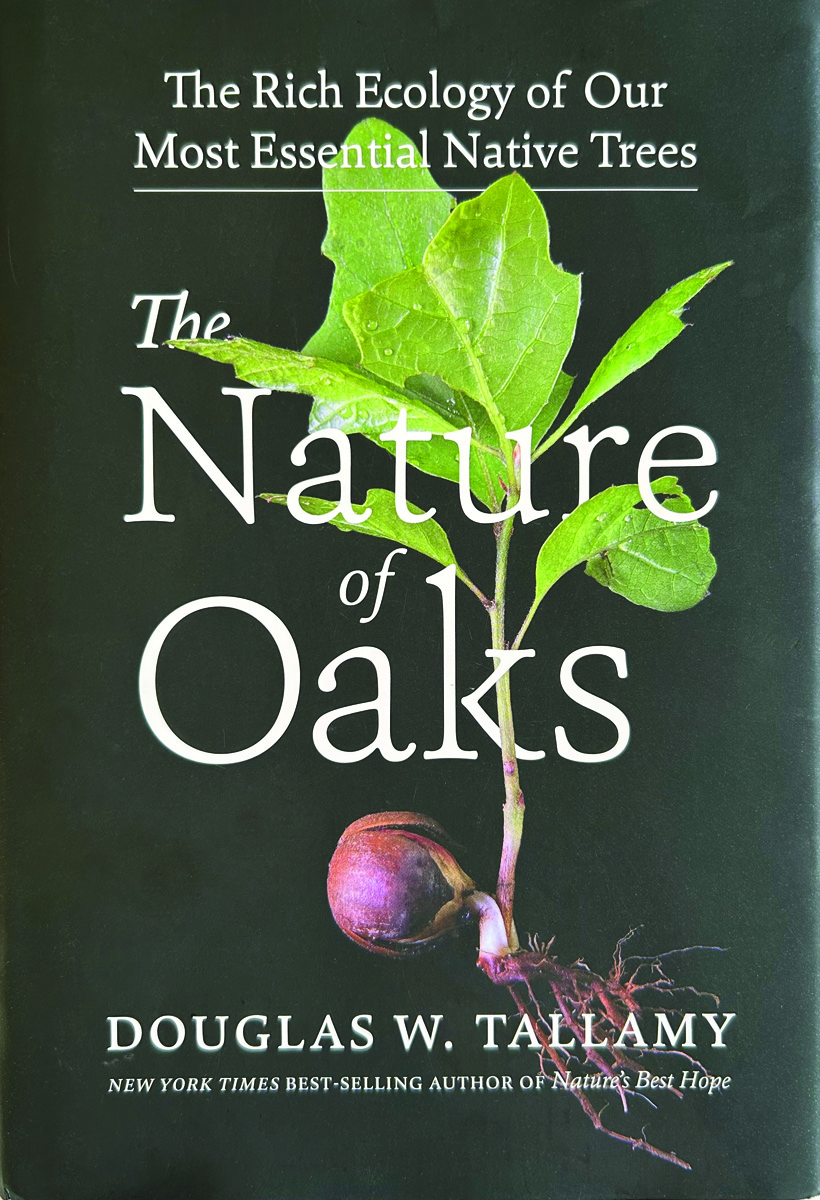
The Nature of Oaks: The Rich Ecology of Our Most Essential Native Trees
Fine Gardening receives a commission for items purchased through links on this site, including Amazon Associates and other affiliate advertising programs.
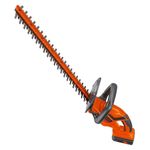
Black and Decker 22-inch Cordless Hedge Trimmer
Fine Gardening receives a commission for items purchased through links on this site, including Amazon Associates and other affiliate advertising programs.
- 38 x 7 x 7 inches
- 6.9 pounds
- 1 Lithium Ion battery required (included)

DeWalt Variable-Speed Cordless Reciprocating Saw
Fine Gardening receives a commission for items purchased through links on this site, including Amazon Associates and other affiliate advertising programs.
- 18.31 x 6.13 x 4 inches
- 1-1/8-inch stroke length
- Variable speed trigger with 0-3000 spm




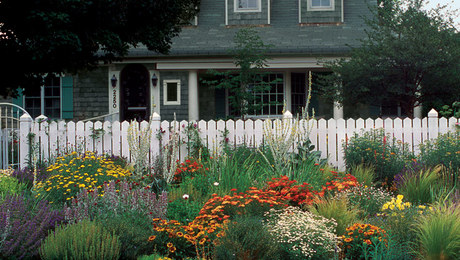
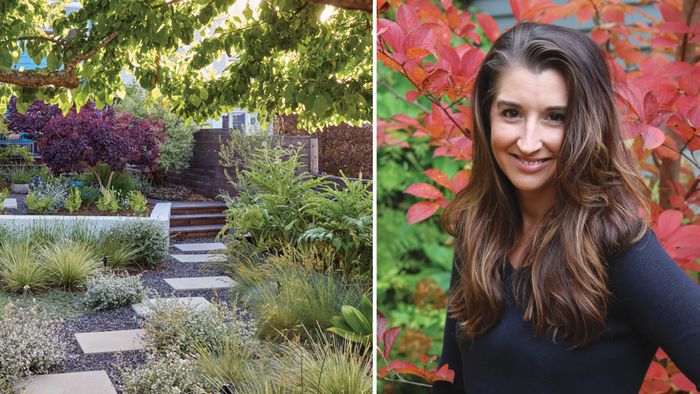
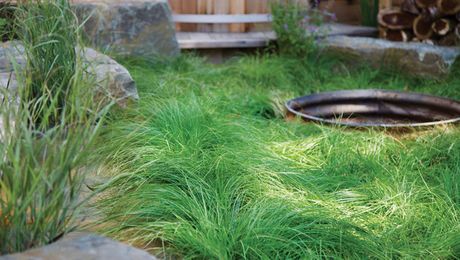
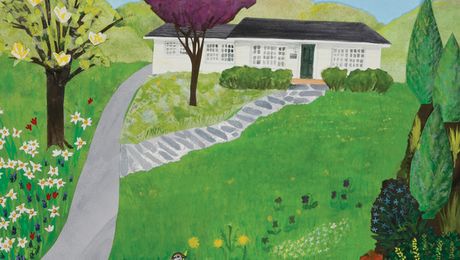










Comments
Wonderful garden and I’m sure it brings much joy to the people who get to walk by.
Amazing transformation! What is the blue flower in the two May photos? It makes a nice contrast and stands out but is too small in the photo for me to see what it is.
In the first May photo with the white geraniums, the blue flowers in the background are Siberian iris. I think they're either 'Big Blue' or 'Dancing Nanou'. In the photo with the white narcissus, the little blue flowers are Virginia bluebells (Mertensia virginica).
Wow! Love all your color.
I enjoyed the photos of your garden. Nice to see the newly planted garden and then how it has filled in. Lovely. Great combinations in your shade garden, especially.
Lovely gardens. That baptisia photo!
You've done a great job with all that clay, your soil work seems to be paying off. I love the progression of bloom colors through the seasons. You have a wonderful variety of plants in what seems to be a quite small space but it doesn't look like a mish-mash as sometimes happens with a multitude of different plants all clumped together. I can imagine the delight experienced by passersby on their daily walks through the flowering year.
So much more fun to look at than an unimaginative grass square of lawn!
Love the way you showed us how it first started out and how it evolved over the years and even months of the growing season!
And such a perfect photo of the bee on the Baptisia...which would have flown on by if you only grass growing there!
Love your spectacular gardens - so much better than turf grass! I am slowly sneaking beds into my front yard, too. Have to be sneaky so the homeowners association doesn't get snarky! : ) Thank you for sharing your great photos.
That's a good point -- for front yard gardens it's important to check local regulations. Hopefully your HOA won't be too bothered! The only thing I have to worry about is the height of the plants in the boulevard so that they don't block sightlines for vehicles.
I have to laugh every time someone mentions Joe Pye Weed.. I bought something years ago that was marked as that. As it turned out it's something that has purple hued leaves and small yellow flowers, that I have yet to find out what it is. Meanwhile it's all over the back yard. I loved the progression of the garden. I think it's really important in this day and age of wanting everything immediately...It just doesn't work that way.
I am totally on your and wittyone's bus here. very smart use of plant materials. I have some suggestions for you to consider:
Carex Bowle's Golden, Chasmanthium latifolium; yucca Colorguard, Cornus Midwinter Fire [winter highlight; can be pruned down], Cotinus Grace [ditto for coppicing], Calycanthus Aphrodite or the new purple leaved one [can give 6' height but is very open and long-blooming, Arum Italicum, taller Alliums, Pennisetum Atropurpureum [deep purple presence of medium height, annual but worth every penny], Perilla purpurescens [ annual deep black-purple multi-season interest, seeds prolifically but v. easy to remove]. Grist for the mill! Congratulations again!
....and Berberis Helmond's Pillar!
Thank you for all the plant suggestions! I do have Chasmanthium latifolium in one of my other gardens and it reseeds itself nicely. I also have a few types of taller Allium (especially Purple Sensation) that do well in full sun. I love how weird looking the big Allium are.
What a beautiful gift to your neighbors! I can imagine many people arranging their walks to include your garden on their route and finding something new and interesting each time. Thank you for sharing.
What a perfect plot of seasonal color and texture! Truly a labor of love, Michelle...
Simply glorious from beginning to end! Not only a gift to your neighbors but to us as well. You mentioned your "other" gardens. Are they as wonderful and full as this one? Pics, please?
Wow, you're my hero. My efforts pale in comparison and I wouldn't attempt this in my front yard because I couldn't make it look this good. But I keep trying in the backyard. :-)
Please do not recommend barberry. We can do much better for plants. If you want that color, please try the native ninebark.
https://wgme.com/news/local/popular-plant-linked-to-lyme-disease-is-now-banned-in-maine
Log in or create an account to post a comment.
Sign up Log in